Ties That Bind
Personal workplace connections create strong teams and positive results
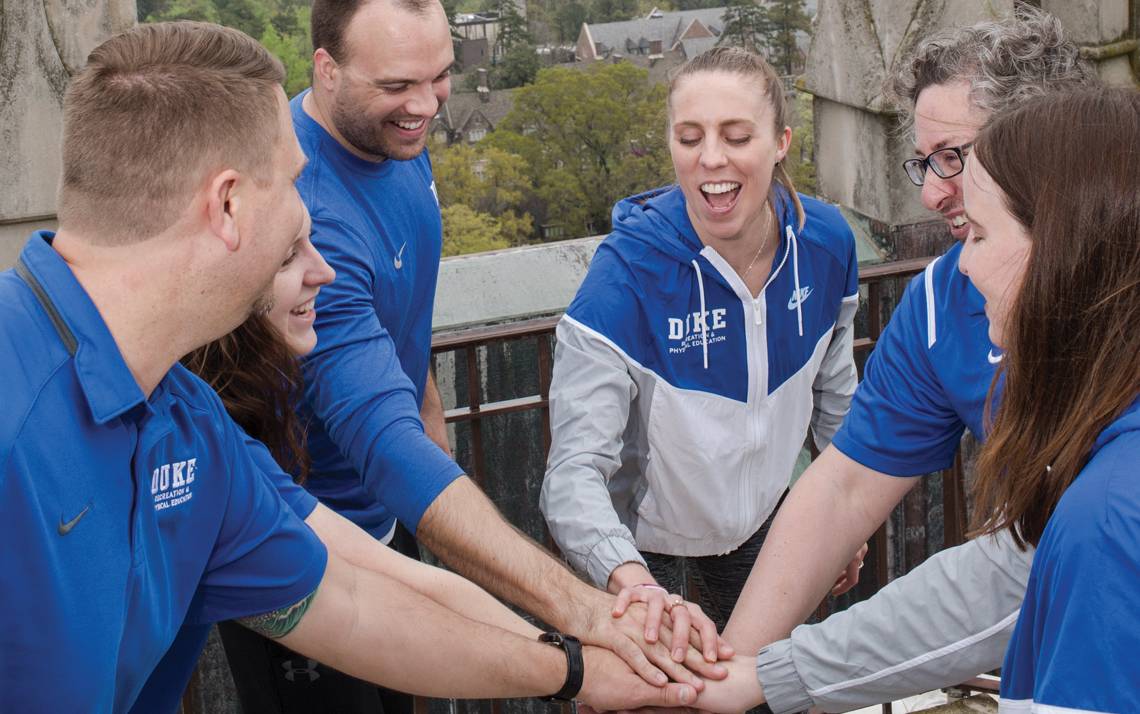
On the morning of Feb. 17, 2007, news was circulating about a city of Durham police officer who was killed in a car crash as he responded to a service call.
Jefferson Frisbie, who was at work at the time, distracted himself with paperwork. When his cell phone rang, he had a sinking feeling in his stomach. A voice on the line informed Frisbie that the officer in the crash was Frisbie’s former bike patrol partner in the Duke University Police Department, Charles Callemyn, 33.
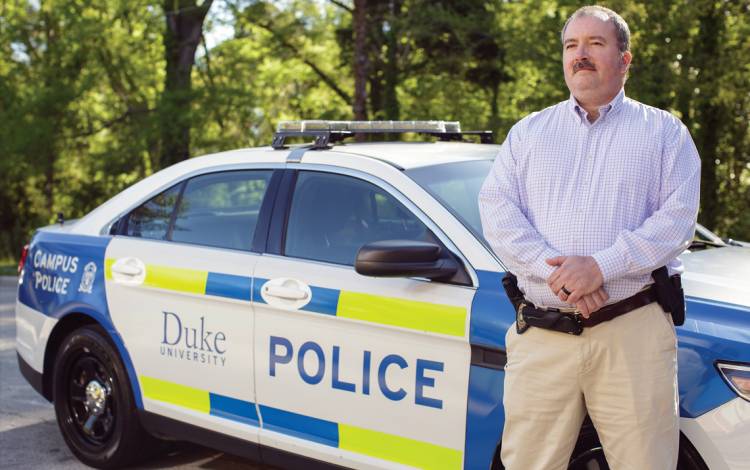 Callemyn served with Duke Police for nearly five years before joining the Durham force, and after his death, Duke and area police officers rallied to support Callemyn’s family, including his mother, Cathy Carter, who works at Duke. They’ve donated money and biked hundreds of miles over the years in “The Road to Hope,” a fundraiser for families of police officers killed in the line of duty.
Callemyn served with Duke Police for nearly five years before joining the Durham force, and after his death, Duke and area police officers rallied to support Callemyn’s family, including his mother, Cathy Carter, who works at Duke. They’ve donated money and biked hundreds of miles over the years in “The Road to Hope,” a fundraiser for families of police officers killed in the line of duty.
“Duke Police is a family,” said Frisbie, a Duke University Police Department investigator. “It didn’t matter that Charles was no longer at Duke. When you serve on this agency, it forms a connection forever.”
The personal connections Duke employees form with one another exist across the University and Health System. Workplace relationships, routinely cited in Duke Human Resources surveys and in Working@Duke’s recent “Six Word Story” contest, foster thriving team environments, stimulate innovation and promote employee retention.
“Discovery is more rewarding among friends,” Emory Nelms, research analyst with Duke’s Social Science Research Center, wrote in March for her Six Word Story about what she values about working at Duke.
According to Gallup’s 2017 “State of the American Workplace” report, people want to build meaningful relationships with coworkers, and research around employee engagement shows a “unique social pattern” among employees in top-performing teams.
“When employees possess a deep sense of affiliation with their team members, they are driven to take positive actions that benefit the business — actions they may not otherwise even consider,” the Gallup report says.
From climbing to the top of Duke University Chapel to humanitarian relief efforts like organizing a food drive after a deadly hurricane, Duke staff and faculty create bonds that benefit the workplace and beyond.
“The more connected you feel to your colleagues, the more passionate you’re going to feel about your work,” said Gina Rogers, practitioner for Duke’s Learning & Organization Development, a unit in Duke Human Resources. “The more passionate you feel about your job, the higher the quality of work you’re going to produce.”
Climbing to New Heights
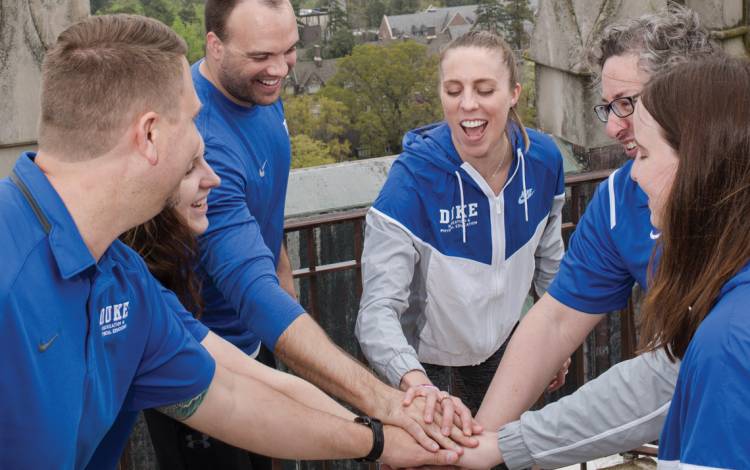
As Emily Skoczlas caught her breath against the damp stone wall during her climb to the top of the 210-foot tall Duke University Chapel, she recited the words of her supervisor, Chris Policastro:
“Breathe in through your nose and out through your mouth.”
Skoczlas continued climbing up the dark, twisting stairwell, all 239-steps, and emerged at the top of the Chapel to high fives from Duke Recreation & Physical Education colleagues.
“You guys are my heroes!” exclaimed Skoczlas, assistant director of recreation facilities for Duke Recreation & Physical Education.
As chair of Duke Recreation’s Engagement Committee, Skoczlas scheduled the Chapel climb in April to build camaraderie among the department’s 28 staff members. She organizes monthly activities around at least one of Duke Recreation’s core values: communication, integrity, teamwork, healthy lifestyles, fun, safety and inclusiveness.
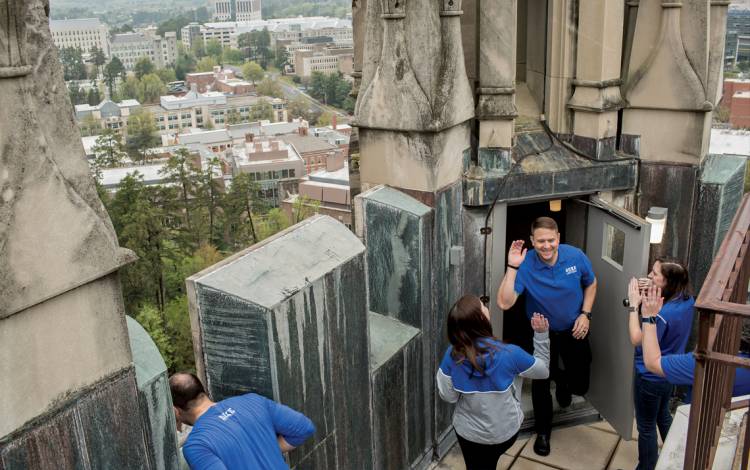 Creating productive experiences where people naturally get to know each other is key to forming personal connections, according to Gallup’s 2017 “State of the American Workplace.” Among recommendations, the report suggests managers bring team members together for events.
Creating productive experiences where people naturally get to know each other is key to forming personal connections, according to Gallup’s 2017 “State of the American Workplace.” Among recommendations, the report suggests managers bring team members together for events.
Skoczlas saw results of Duke Recreation’s teambuilding during last year’s “Brodie Blowout,” an event introducing first-year students to Duke Recreation programming with food, a live DJ and dunking booths.
When the party ended at 10 p.m., Skoczlas was ready for a late night of clean up. But as she carried trash to bins, 20 colleagues, who weren’t required to stay, joined the effort, sweeping up food scraps and packing leftover party supplies.
“When we take the time to engage and cheer one another on, it translates to better-run events and a better atmosphere in the office,” Skoczlas said. “There’s no doubt in my mind that the personal connections I formed with my coworkers convinced them to help. I would have done the same for them.”
Creating Special Bonds
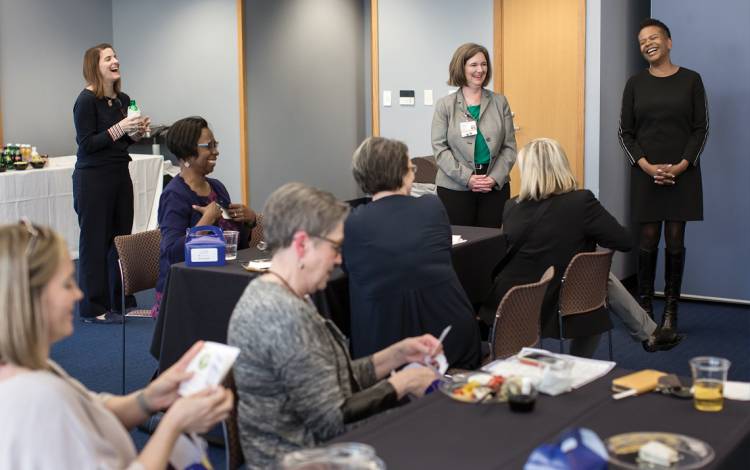
Catherine Liao and Leslie Mason had two months to plan a conference at Duke about advanced practice nursing programs for 27 of North Carolina’s medical leaders.
Liao, assistant vice president of Duke Health Government Relations, and Mason, chief of staff for Duke’s vice president of Patient Care Services, met through WeLEAD, a Health System affinity group connecting women executives.
They got acquainted at a WeLEAD professional development lunch, where they discussed working with local, state and federal policymakers. When it came time to plan the conference, they had already bonded and jumped into planning, booking a board room in Duke South and setting an itinerary for Duke leaders to discuss nursing graduate programs.
“Having that framework from WeLEAD made it easy to work together because we were already acquainted and could jump right into what some of our meeting goals could be,” Liao said.
Affinity groups help build relationships and form communities of those with like minds and interests. In addition to WeLEAD, the Health System hosts Duke MINDS for young professionals, and Duke Military Association for veterans and active service members. About 200 employees participate across all groups. The goal is to introduce other affinity groups over time.
Rhonda Brandon, chief HR Officer for Duke University Health System, said the Health System worked with a team to initiate affinity groups after analyzing survey data that indicated former and current employees want an enhanced sense of belonging.
“Any time you strengthen relationships, that improves trust and removes barriers,” Brandon said. “You feel more comfortable going outside your comfort zone.”
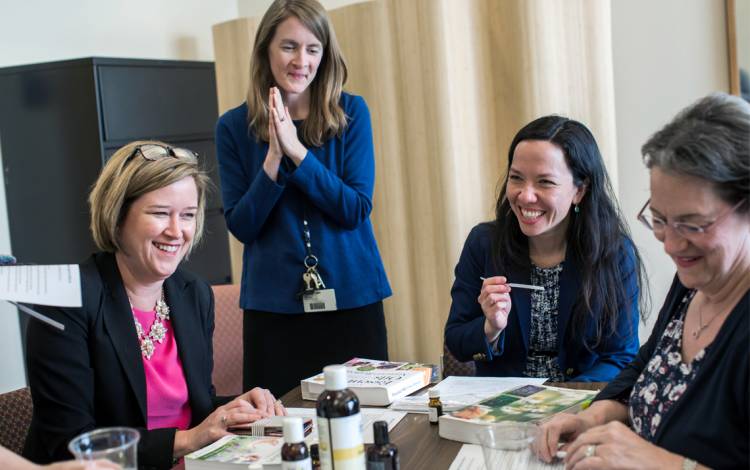 That sentiment is echoed in Gallup’s “State of the American Workplace,” which says that social situations “can take on a very powerful dynamic in which casual, friendly conversations turn into innovative discussions about how the team or organization can thrive.”
That sentiment is echoed in Gallup’s “State of the American Workplace,” which says that social situations “can take on a very powerful dynamic in which casual, friendly conversations turn into innovative discussions about how the team or organization can thrive.”
These discussions are sparked during affinity group gatherings such as a WeLEAD self-care event in March with nearly 20 women executives from across the Health System.
During the event, participants, including Liao, learned tips for practicing self-care while balancing career and home life. Everyone took home a resilience kit that contained a mini journal, among other items, to enhance well-being.
“It’s extremely helpful to have WeLEAD,” Liao said. “I’m grateful for the time getting to know all of these exceptional women before I may need to contact them for help in a pinch.”
Acts of Compassion
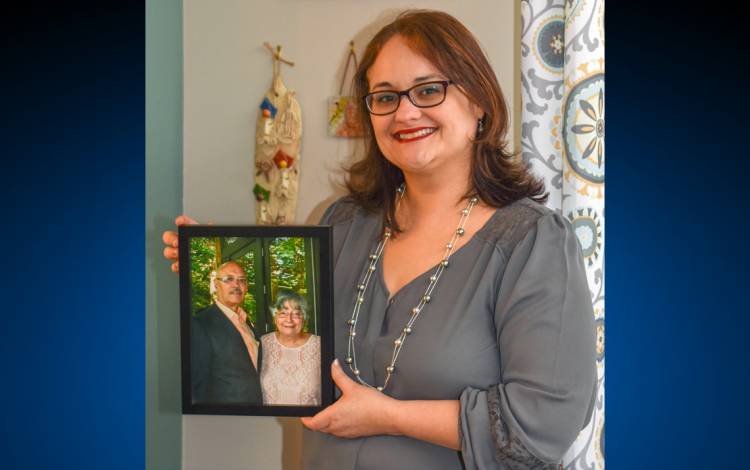
Tears flowed when Katherine Ortiz learned that Duke Human Resources colleagues organized a food drive to help victims of Hurricane Irma and Hurricane Maria in the fall of 2017.
Ortiz’s parents, who live in a suburb outside of San Juan, Puerto Rico, were without power for two months, did not have access to clean water and struggled to find non-perishable food.
Robin Pietrantoni, manager of Duke Temporary Services, and Jemma Boler, a recruiter for Duke Recruitment, included Ortiz’s parents in a food drive for Human Resources employees’ family members living in the U.S. Virgin Islands and Puerto Rico. They led an effort to collect about 400 pounds of canned goods, bottled water, paper products, batteries and toiletries for the families.
“There are some benefits that can’t be written down,” said Ortiz, retirement plans manager for Human Resources, who has worked at Duke 11 years. “I was lucky to have colleagues who understood I was struggling. I could never envision leaving an environment that is so supportive.”
The average length of service for Duke employees is 9.6 years, about five years longer than the average worker in the U.S., according to the Bureau of Labor Statistics.
In an October 2018 interview with the Society for Human Resource Management, researcher and workplace-trends expert Dan Schawbel said personal connections increase loyalty and decrease turnover.
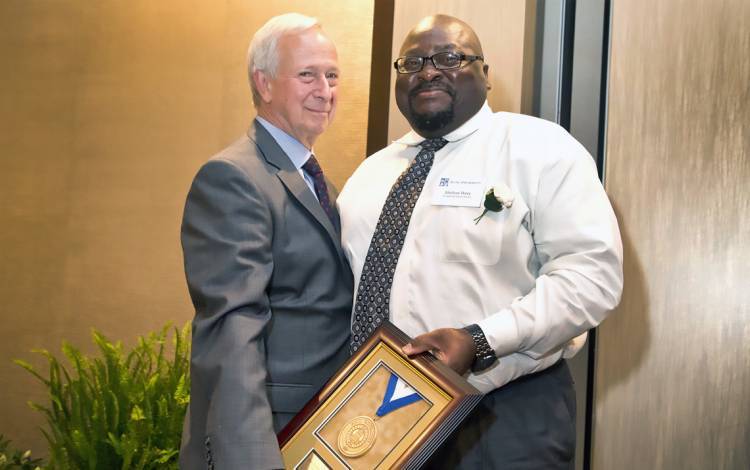 “When people feel like they belong to a team that supports their personal needs, they are naturally more productive and committed to the organization,” Schawbel, author of “Back to Human: How Great Leaders Create Connection in the Age of Isolation,” said in the interview.
“When people feel like they belong to a team that supports their personal needs, they are naturally more productive and committed to the organization,” Schawbel, author of “Back to Human: How Great Leaders Create Connection in the Age of Isolation,” said in the interview.
Consider Shelton Perry, who manages analysts who monitor the performance of a system that handles scheduling, patient information and lab data in Duke Health Technology Solutions.
His team reports to work in severe weather to keep Health System technology running. Braving the weather, Perry brings in baked chicken during winter storms or delivers take-out meals to colleagues. Perry’s actions earned him a Presidential Award, one of Duke’s highest honors, in 2017.
“When someone is on my team, they’re considered family,” Perry said. “That means stepping up to make sure they have what they need. They shouldn’t feel alone.”
Have a story idea or news to share? Share it with Working@Duke